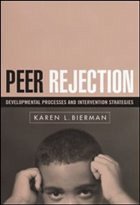Table of contents:
Part 1: Understanding Problematic Peer Relations. The Developmental Significance of Peer Relations. Characteristics of Rejected Children. Rejection Processes: The Role of Peers. Peer Relations and the Developing Self. Part 2: Assessing Social Competence and Peer Relations. Assessment Goals and Strategies. Assessing Problematic Peer Relations. Assessing Social Behavior. Observing Peer Interactions. Assessing Self-System Processes. Part 3: Intervention Methods. Approaches to Intervention. The Design of Social Competence Coaching Programs. Intervention Process and the Promotion of Self-System Change. Collateral Interventions for School and Home. Future Directions. Appendix. Description of Exemplar Session Activities.
Addressing the widespread and painful problem of chronic peer rejection, this volume combines up-to-date research and practical strategies for school- and clinic-based intervention. An innovative developmental framework is presented for understanding why certain children face rejection, the peer group dynamics involved, and implications for social-emotional development and mental health. Strategies for assessing rejected children are discussed in detail, with attention to individual social competence variables as well as transactional influences. Clear guidelines are delineated for planning and implementing effective social competence coaching programs, as well as multicomponent interventions and school-based strategies. Providing invaluable recommendations for practice that are solidly grounded in the empirical literature, the book is illustrated throughout with revealing case studies and interviews.
Addressing the widespread and painful problem of chronic peer rejection, this volume combines up-to-date research and practical strategies for school-, and clinic-based intervention.
Part 1: Understanding Problematic Peer Relations. The Developmental Significance of Peer Relations. Characteristics of Rejected Children. Rejection Processes: The Role of Peers. Peer Relations and the Developing Self. Part 2: Assessing Social Competence and Peer Relations. Assessment Goals and Strategies. Assessing Problematic Peer Relations. Assessing Social Behavior. Observing Peer Interactions. Assessing Self-System Processes. Part 3: Intervention Methods. Approaches to Intervention. The Design of Social Competence Coaching Programs. Intervention Process and the Promotion of Self-System Change. Collateral Interventions for School and Home. Future Directions. Appendix. Description of Exemplar Session Activities.
Addressing the widespread and painful problem of chronic peer rejection, this volume combines up-to-date research and practical strategies for school- and clinic-based intervention. An innovative developmental framework is presented for understanding why certain children face rejection, the peer group dynamics involved, and implications for social-emotional development and mental health. Strategies for assessing rejected children are discussed in detail, with attention to individual social competence variables as well as transactional influences. Clear guidelines are delineated for planning and implementing effective social competence coaching programs, as well as multicomponent interventions and school-based strategies. Providing invaluable recommendations for practice that are solidly grounded in the empirical literature, the book is illustrated throughout with revealing case studies and interviews.
Addressing the widespread and painful problem of chronic peer rejection, this volume combines up-to-date research and practical strategies for school-, and clinic-based intervention.

